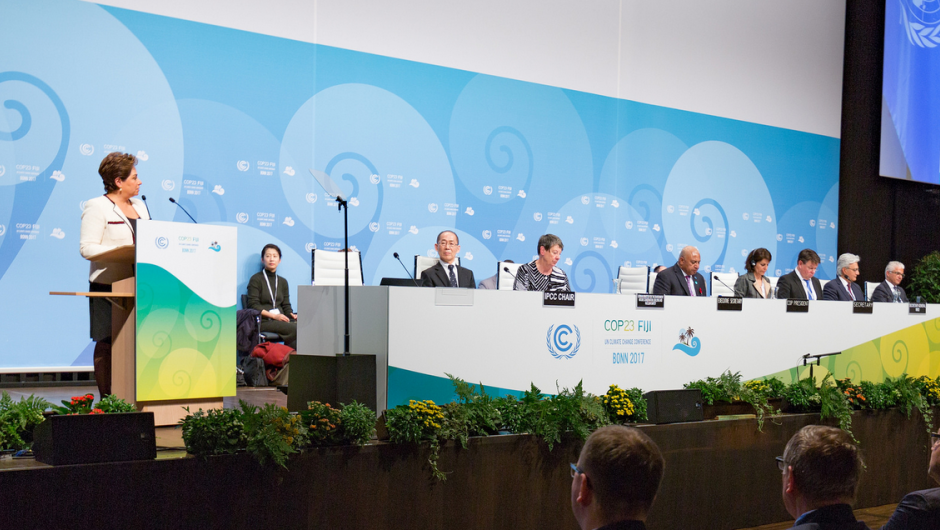Dhaka, Nov 6 – This year’s UN Climate Change Conference kicked off in Bonn, Germany on Monday with strong, unified calls to hold to the path of the Paris Climate Change Agreement.
The opening of the conference (COP23, November 6-17) takes place against this year’s background of destructive hurricanes, fires, floods, droughts, melting ice and impacts on agriculture which threaten food security.“All over the world, vast numbers of people are suffering – bewildered by the forces ranged against them. Our job as leaders is to respond to the suffering with all means available to us,” said newly elected COP23 President, Fijian Prime Minister Frank Bainimarama. “This means to meet our commitments in full, not back away from them.”
Bainimarama said that Fiji is working to build a “Grand Coalition” throughout the year between governments at every level, civil society, the private sector and faith-based organizations, according to the UN Climate Change News.
UN Climate Change Executive Secretary of Patricia Espinosa said, “Together with the Sustainable Development Agenda, we have a clear path forward to truly address climate change and sustainable development.”
Espinosa outlined the work governments will be looking to address in Bonn – above all to take the next essential steps to ensure that the Paris Agreement’s operating system is completed in time and ways and means to implement it are strengthened.
This is essential so that the ultimate goal of the Paris Agreement can be achieved – to hold the global average temperature rise from pre-industrial time to well below 2 degrees Celsius and as close as possible to 1.5 degrees.
Espinosa underlined that immediate progress was urgent. “We need to move forward to fulfil the commitments that are due in 2020. In this regard, finance and pledges to cut greenhouse gas emissions are key,” she said.
Whilst Fiji has the Presidency of COP23, the Government of Germany is providing the substantial and generous logistical resources.
German Environment Minister Barbara Hendricks reiterated her countries support for the UN and pointed out that as the home of the UN Climate Change Secretariat, Bonn is evolving into a global centre of climate action and an international hub for sustainable development.
The German Minister also had some good news with regard to finance for developing countries. She announced that Germany would support the UN’s Adaptation Fund with an additional 50 million Euros in 2017.
During COP23, the city of Bonn will not only host the conference but many cultural events that will help bring climate action closer to people in the city.
Many Bonn citizens are engaged as volunteers. And Bonn schools are on board, including the school children who sang along with artist Bernadette La Hengst in the COP23 song “I’m an Island”, produced with the help of Germany’s Development Ministry- UNB
Meanwhile, an AFP Report from Paris says: Wealthy countries are falling well short of their pledge to provide $100 billion a year to developing countries by 2020 as part of the Paris climate accord, a report published Monday said.
Of the $111 billion invested in clean energy technologies, only $10 billion was provided by rich countries, according to data compiled by Bloomberg New Energy Finance.
The pledge was first made at a Copenhagen summit in 2009 and confirmed by signatories of the 2015 Paris Agreement to limit global warming caused by greenhouse gas emissions.
The $100 billion, to be raised from multiple sources including from the private sector, was intended to be a minimum, with nations expected to set a new goal by 2025.
UN negotiators meeting in Bonn, Germany, this week are trying to work out how to implement the Paris accord, which aims to keep warming at “well under two degrees Celsius” (3.6 degrees Fahrenheit) above pre-industrial levels.
But US President Donald Trump has pulled his country out of the deal, and analysts have warned that other national leaders may struggle to find the funds to match their ambitions.
On Monday, Standard and Poor’s released a report questioning where the money would come from, citing a need for many countries to increase budgets and debt burdens to finance their pledges.
“In our view, it is very unlikely that governments would be willing, or able, to risk deteriorating their creditworthiness by stretching their budgets and debt burdens to fund the implementation costs,” the analysts wrote.
But Bloomberg New Energy Finance also said that developing countries needed to improve legal frameworks in order to make investments in clean energy more attractive, both for public and private investors.




